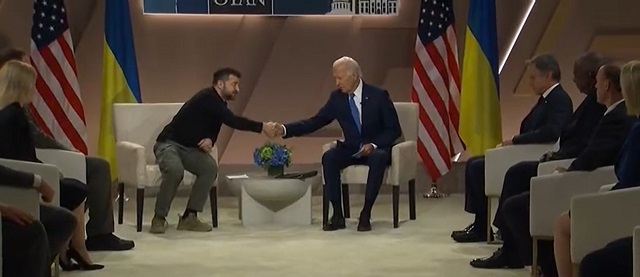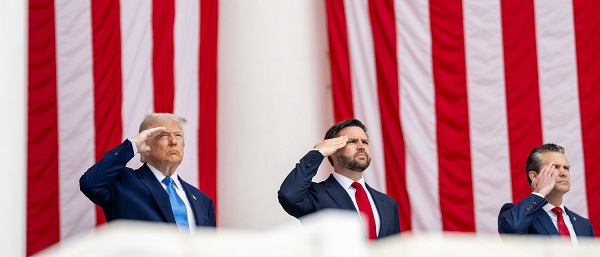conflict
Biden-Harris Stumble Towards World War III

From the Daily Caller News Foundation
During the ABC debate between Vice President Kamala Harris and former President Donald Trump, the former president issued a warning that should terrify every American: “[President Joe Biden] had no idea how to stop [the war in Ukraine]. And now you have millions of people dead and it’s only getting worse and it could lead to World War 3. Don’t kid yourself, David. We’re playing with World War 3. And we have a president that we don’t even know if he’s— where is our president?”
The debate “moderator” whistled right past Trump’s warning and asked him in response if he wanted “Ukraine to win this war?” I’ve heard more thoughtful questions from a 4th grader.
What Trump made clear — and ABC blithely ignored — is that the Biden administration is risking a world war over Ukraine. The last time we got this close to the use of nuclear weapons, the issues at hand were West Berlin and Russian missiles 90 miles off the coast of Florida. Then, unlike now, the American people clearly understood what was at risk. The presidents who oversaw those crises explained their calculus to the public.
But the Biden administration has edged the country closer and closer to a world war with little public debate. The United States is currently mired chest-deep in what strategists coyly call a “proxy war” with Russia. We’re supplying weapons, military advice, money and intelligence — and Ukraine is providing the warm bodies.
As the price tag of this proxy war creeps towards $200 billion, few Americans even understand the ultimate goal. There has been precious little talk in Washington, D.C. about what a “win” might look like for Ukraine. Biden, who Trump rightly points out has been mostly missing in action, has ignored Vladimir Putin’s requests to negotiate a settlement. More worrisomely, the Biden administration seems to be seriously considering escalating the United States’ involvement.
Ukrainian President Volodymyr Zelensky is said to be working on “a plan” to present to Biden about how to end the war. Zelensky darkly warned last month, “There can be no compromises with Putin, dialogue today is in principle empty and meaningless because he does not want to end the war diplomatically.”
Before Congress gives another red cent to Ukraine, the American people should have an opportunity to read and evaluate Zelensky’s plan. A “no compromises” end to the war is insanely unrealistic short of a complete collapse of the Russian army — Putin has made clear he will never accept Ukraine as a member of NATO or give up Crimea.
Last week, Biden said he is open to allowing Ukraine to hit targets deeper within Russia with American-supplied missiles. It does not take a military genius to understand that Zelensky would love to see the United States and NATO directly enter the war. That is Ukraine’s best shot at the “win” its leader has outlined, as Russia is out-producing Ukraine in soldiers and war materiel.
Zelensky’s requests to escalate U.S. involvement in the conflict should be evaluated with extreme caution. Specifically, Ukraine wants targeting restrictions lifted from the Army’s Tactical Missile System (ATACMS). Biden sent the missiles to Ukraine as part of last spring’s aid package and is said to be considering lifting the restrictions as I write this.
It is a horrible idea.
Firstly, Russia has made clear that the lifting of restrictions would be tantamount to direct American involvement in the war. “Washington and other European states are becoming parties to the war in Ukraine,” Vyacheslav Volodin, the chairman of Russia’s State Duma, the lower house of parliament said.
Secondly, Ukraine has already attacked Moscow repeatedly with drones. Were it to bomb the Kremlin with a U.S.-manufactured and sanctioned ATACM, what would Putin’s response be? Imagine a Russian missile hitting Washington with the blessings of Moscow.
Lastly, pray that Biden’s team is taking seriously Putin’s threats to use nuclear weapons in the conflict. Britain’s MI6 Chief Richard Moore recently remarked that the “Russian intelligence service has gone a bit feral,” while the CIA acknowledged that Russia nearly went nuclear over the Ukraine war in the summer of 2022.
As Trump warned at the debate, “[Putin has] nuclear weapons. Nobody ever thinks about that. And eventually, maybe he’ll use them.”
Our best hope to avoid that scenario is a swift return to rational statecraft.
Morgan Murphy is military thought leader, former press secretary to the Secretary of Defense and national security advisor in the U.S. Senate.
Artificial Intelligence
AI Drone ‘Swarms’ Unleashed On Ukraine Battlefields, Marking New Era Of Warfare


From the Daily Caller News Foundation
Artificial intelligence-powered drones are making their first appearances on the battlefield in the Russia-Ukraine war as warfare creeps closer to full automation.
In bombardments on Russian targets in the past year, Ukrainian drones acting in concert were able to independently determine where to strike without human input.
It’s the first battlefield use of AI “swarm” technology in a real-world environment, a senior Ukrainian official and Swarmer, the company who makes the software, told the Wall Street Journal in a Tuesday report. While drones have increasingly defined modern battlefields, swarms until now had been confined to testing rather than combat.
“You set the target and the drones do the rest,” Swarmer Chief Executive Serhii Kupriienko told the WSJ. “They work together, they adapt.”
So far, the Swarmer technology has been used hundreds of times to target Russia assets, but was first used a year ago to lay mines on the front, the Ukrainian official told the WSJ. The software has been tested with up to 25 drones at once, but is usually utilized with only three.
Kupriienko told the WSJ that he was preparing to test up to 100 drones at once with the linking software.
A common arrangement used on the battlefield includes one reconnaissance drone to scout out the target and two explosive drones delivering the payload on target, the official told the WSJ.
While Western nations such as the U.S., France and the United Kingdom are also pursuing drone swarm technology, they have not deployed swarm technology on the battlefield the way Ukraine has, according to the WSJ. Currently, autonomous weapons are not regulated by any international authority or binding agreement, but ethical concerns around the technology has led many to call for increased regulation of weapons like the Swarmer system.
The Ukrainian Ministry of Foreign Affairs did not immediately respond to the Daily Caller News Foundation’s request for comment.
conflict
Trump Pentagon Reportedly Blocking Ukraine From Firing Western Missiles Deep Into Russia


From the Daily Caller News Foundation
The Department of Defense has spent months blocking the Ukrainian military from using American and British-made missiles to hit targets deep inside Russia, The Wall Street Journal reported Sunday, citing unnamed U.S. officials.
Undersecretary of Defense for Policy Eldridge Colby reportedly designed the procedure to review requests to carry out the long-range strikes with weapons that are either of U.S. origin or that require American intelligence or use components provided by the U.S., according to the WSJ. Secretary of Defense Pete Hegseth reportedly has the final say on whether Ukrainian forces can use the MGM-140 ATACMS (Army Tactical Missile System) to hit targets in Russia.
The reported blocks on missile strikes coincides with a Trump administration effort to broker a peace deal between Russia and Ukraine. A Pentagon spokesperson declined to comment further on the matter.
BREAKING: President Vladimir Putin reacts to B-2 Flyover pic.twitter.com/1mzVn7DxlW
— Jack Poso 🇺🇸 (@JackPosobiec) August 15, 2025
The Biden administration allowed Ukraine to carry out strikes with ATACMS in November, weeks after President Donald Trump won the 2024 election, the New York Times reported. Trump criticized the move during a December interview with Time magazine.
“It’s crazy what’s taking place. It’s crazy,” Trump said. “I disagree very vehemently with sending missiles hundreds of miles into Russia. Why are we doing that? We’re just escalating this war and making it worse. That should not have been allowed to be done.”
Trump and Russian President Vladimir Putin met in Alaska on Aug. 15 for a summit meeting during which Trump sought to secure a cease-fire in Russia’s war with Ukraine. As Trump greeted Putin, a B-2A Spirit stealth bomber and several fighters carried out a flyover of Elmendorf Air Force Base.
Trump met with Ukrainian President Volodymyr Zelensky and major European leaders on Aug. 18 to update them on the summit.
In July, Trump reached an agreement with NATO where members of the alliance would purchase weapons, including MIM-104 Patriot surface-to-air missiles, and donate them to Ukraine.
-

 Business21 hours ago
Business21 hours agoTrans Mountain executive says it’s time to fix the system, expand access, and think like a nation builder
-

 Alberta2 days ago
Alberta2 days agoCoutts border officers seize 77 KG of cocaine in commercial truck entering Canada – Street value of $7 Million
-

 Business2 days ago
Business2 days agoThe painful return of food inflation exposes Canada’s trade failures
-

 Alberta1 day ago
Alberta1 day agoPremier Smith sending teachers back to school and setting up classroom complexity task force
-

 Alberta1 day ago
Alberta1 day agoThousands of Albertans march to demand independence from Canada
-

 Crime1 day ago
Crime1 day agoSuspect caught trying to flee France after $100 million Louvre jewel robbery
-

 Addictions22 hours ago
Addictions22 hours agoThe Shaky Science Behind Harm Reduction and Pediatric Gender Medicine
-

 Business2 days ago
Business2 days agoCBC uses tax dollars to hire more bureaucrats, fewer journalists








